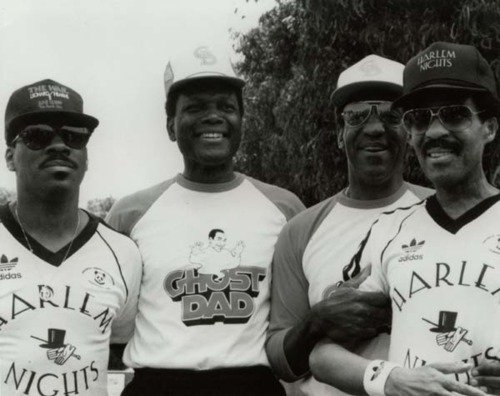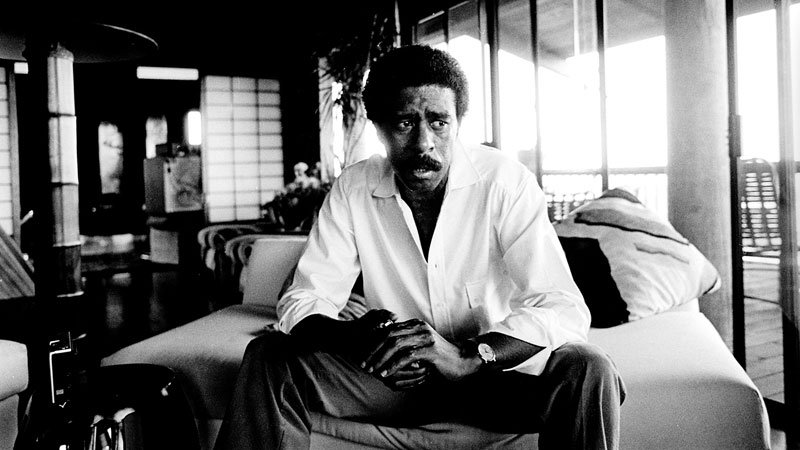Richard Pryor
A lot of the Legends of the Months so far have been people that I’d really like to be. At least for a little while. I’d like to be Leonardo Da Vinci, and just solve some shit, or be Muddy Waters and start something incredible. The Legends are people who were, of course talented, but also, and more importantly, hugely dedicated and hard-working.
I would not like to be Richard Pryor. I did some time as a stand-up comedian, and I liked it. Richard Pryor’s ability and success was of course enviable. The man was an outstanding performer, there’s no two ways about it. But he was also helplessly dedicated to drugs for most of his life. He did what he did the hard way. His life was never easy, even when he was the hottest commodity in Hollywood, and life should have been easy, he fucked things up and made it extremely difficult. But he still did it.
He was raised in a whorehouse. An actual brothel, so that might go some way to explaining both his love for women, and his disregard for them. He married five different women, and two of them twice. He cheated on all of them and beat them. His autobiography Pryor Convictions: And Other Life Sentences read almost like a history of domestic abuse. And narcotic abuse. All types of abuse, really. When he was young he was forced to perform oral sex on an older boy. He was abused by a priest and his family let it slide. Later in life he became an addict, a junkie. In his own words, he was ‘a drug-addicted, paranoid, frightened, lonely, sad and frustrated comedian who’d gotten too big for his britches.’
In what is known as the ‘freebasing incident‘ he once got so incredibly high that when he ran out of cocaine he quickly reached the decision that he needed to set himself on fire. So he did just that. He poured cognac all over himself and set himself on fire. His cousin and his aunt rushed to help him by smothering the flames in a sheet, but he thought they were trying to kill him, so he jumped out the window and ran down the street.
This happened.
He was scarred from his ears to his thighs. On his upper body ‘third-degree burns turned what was once smooth, unmarked, brown skin into a raw, fleshy paste that oozed brown pus and left the nerves exposed.’
Em. Ouch. His time in hospital didn’t seem fun. He describes being washed by a gentle nurse with a soft sponge by inventing a new compound word: ‘shitfuckmothererohgoddamnshitfuckgodhelpmefuckfuckfuckfuck’.
At his worst he drank a bottle of vodka a day and spent upwards of a quarter of a million dollars a year on cocaine.
So why is he a HeadStuff Legend of the Month?
Because the man was funny. He was incredibly funny. Despite all of his issues and addictions and doubts, he had a wonderful career. And he was honest. The honesty in his stand-up was something that most comedians miss. Even big comedians, world famous ones sometimes. They lack that honesty that Richard Pryor had, which is why, above any other reason in my opinion, he was who he was.
It didn’t start out that way. He knew from an early age that he was funny, but he was probably destined to be the pimp that he was nearly groomed to be until he started singing in a club for money. He was basically blagging it, but the club booker liked his ballsiness. Pryor told stories in between the songs that he basically made up as he sang. Unsuprisingly the anecdotes between the songs got better reactions than the songs so the ratio between song and anecdote went more and more in favour of the anecdote. Eventually the music was gone and Richard Pryor was a comedian.
[youtube id=”mmZm2HBMtTQ” align=”center” autoplay=”no” maxwidth=”550″]
He moved to New York to get out of Peoria where he was born, raised and would have probably died if he didn’t instead become a major superstar. Thin lines. In New York he watched Bill Cosby and saw him on the cover of Time Magazine. Another black comic. Pryor started imitating Bill Cosby. And he did well, but you can never scale the heights Cosby was enjoying as an imitator. No matter how good you are.
There’s no point in me telling you all about everything he did. He did a lot of stuff. Told a lot of jokes, made concert films and comedy albums, made blockbuster movies, and terrible movies, he made TV shows and he made lots of children. One of whom, Rain Pryor, took the stage after I was on the stage in a competition in Edinburgh. How about that for a claim to fame? It’s possible that some of Richard Pryor’s blood saw me performing stand-up comedy. I wonder if she laughed.
You can look him up, and I recommend you do. Watch his concert films. Try and find Live & Smokin’ and then compare that to the later Richard Pryor Live in Concert to see how he developed. Watch his movies, and then, for a smack in the face, read his autobiography. He led some life. The Maxim quote on the cover, “Makes Jesus’ life look utterly tedious”, isn’t far wrong. It is packed cover to cover with that trademark honesty that I spoke about. This is not a description of his achievements. Or a lap of honour. If this book was written by someone else it would be disregarded as a personal attack on a troubled comedian. But this was written by himself. And he is not the good guy in the book. He often seems terrible, but you sympathise. You let him away with things, and I’m not saying that’s a good thing, and it doesn’t excuse any of the bad things he did, but I admire the honesty. Here’s a man who’s been loved his whole life. Been lauded as a genius, had money thrown at him, and “womens”, which he rarely turned away. He was suffering from Multiple Sclerosis when he wrote this book. He could easily have made himself out to be a hero, a true saintly pioneer who changed comedy, changed movies and changed how America treated black people. But he doesn’t take credit for any of those things. He understood the importance of Martin Luther King Jr. and Malcolm X. He understood the importance of Bill Cosby and all the other comedians of his time. He paints some of his great achievements as lucky breaks, or right place right time type situations. He knew he was good and he knew what he could do, and he did it. Otherwise he didn’t think he was any better than anyone else. He was just doing a job. Actually, except Cleavon Little. He did think that he should have had his role in Blazing Saddles, a film he wrote with Mel Brooks, and he was meant for that role. He said Cleavon Little was good, but he would have been better.
Probably the first thing I saw Pryor in was See No Evil, Hear No Evil which I loved when I was younger. He describes it as “another lackluster comedy reteaming me with Gene Wilder”. He openly admits he did it for the money, along with plenty of other bad movies that he made. Notably Superman III, which he describes as a piece of shit. But he didn’t need to read the script to agree to do it; he was offered four million dollars. “For a piece of shit,” he told his agent when he read the script. “it smells great.”
Though I still have a soft spot for See No Evil, Hear No Evil and Stir Crazy which he also starred in with Gene Wilder. When you read his autobiography you understand how drugged up he was while making that film, and it’s quite surprising that it got made at all.

Next thing for me was I got big into Eddie Murphy. I loved his movies, Beverly Hills Cop, 48 Hours, Trading Places (Holy shit! I just looked up Eddie Murphy on IMDB and there’s Beverly Hills Cop 4 announced!). I got into Eddie Murphy’s stand up; Raw was an incredible show. Then I learned that he was very heavily influenced by Richard Pryor, so I went back to Richard Pryor, and I could see it, plain as day (a clear day, you have to specify these things in Ireland), especially when they both imitated white people.
Since then I had seen pictures of Pryor and Murphy together. I thought since then that Eddie Murphy loved Richard Pryor and that probably Pryor appreciated Murphy and thought fondly of him, maybe as a protegé… I just like everyone to be friends. But, again, honest as the day (depending on the day, I suppose) here’s ol’ Rich talking about young Eddie:
“At the end of 1988, I worked on Harlem Nights, Eddie Murphy’s pet movie project. At the time, no one was bigger. Exercising his clout, he was the picture’s writer, director, and star. He was trying to scale the mountain that I climbed making Jo Jo. I should’ve warned the motherfucker.
“I never connected with Eddie. People talked about how my work had influenced Eddie, and perhaps it did. But I always thought Eddie’s comedy was mean. I used to say, “Eddie, be a little nice,” and that would piss him off.
But Eddie can act. I don’t care what people say, the motherfucker is a great actor.”
Of course, that didn’t stop Eddie Murphy from saying:
“Richard Pryor is truly one of the great artists of our time. His comic genius and influence remain unparalleled.”
Which is nice. And true.
Richard Pryor has always been, to me, one of the key figures in modern culture to popularize the word ‘nigger’ for everyday use between black people. It’s obviously an awful, hate-filled word, but the thinking was to make the word commonplace, to remove its power and therefore make it redundant. Black people who used it were taking the word back. It wouldn’t be pejorative anymore. The new Richard Pryor, the post-Bill-Cosby-impersonating Richard Pryor was all about it. He was edgy, incisive, profane and entirely courageous (yes, I got these words from the blurb on the book, but they’re right). No one else was doing what he was doing – yes, there were many to do it after him, but none before.
Then he went to Africa.
That changed everything. He gave the word up:
“I also left [Africa] regretting ever having uttered the word ‘nigger’ on a stage or off it. It was a wretched word. Its connotations weren’t funny even when people laughed. To this day I wish I’d never said the word. I felt its lameness. It was misunderstood by people. They didn’t get what I was talking about.
Neither did I.
I wish that I’d kept my mouth shut.
But that was a hard thing to do. An impossible thing to do.
It wasn’t too late, though.
And so I vowed never to use it again.
[youtube id=”Y6XaSp4ljrk” align=”center” autoplay=”no” maxwidth=”550″]
I’ve been been banging on now about him for a while, so I’ll just leave you with one more short anecdote from Pryor Convictions:
Richard Pryor claimed to be “gay for two weeks” when he went home with a beautiful woman who turned out to be a man. He slept with the man anyway and continued seeing him for two weeks. He just didn’t care. He was attracted to the woman that the man wanted to be. After that relationship ended, the man had the sex change operation he had always wanted, but by then Richard Pryor had moved on. He was straight again.


